Iran-Backed Houthis Push To Take Yemen's Oil-Rich Marib
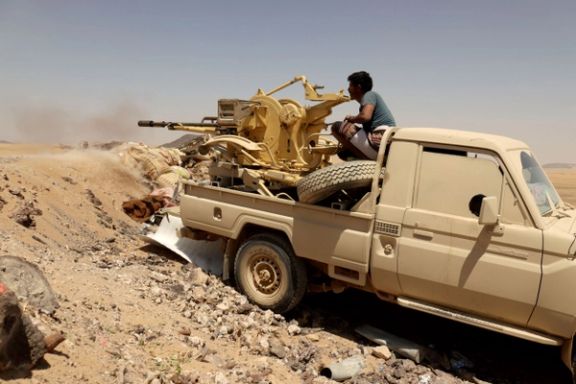
Fighting continued near the city of Marib in Yemen on Sunday between Iran-backed rebels and forces loyal to Yemen's internationally recognized government.

Fighting continued near the city of Marib in Yemen on Sunday between Iran-backed rebels and forces loyal to Yemen's internationally recognized government.
Last week, security officials said at least 200 fighters were killed in clashes between Yemen's government forces and Houthi rebels in and around the strategic central province of Marib over two days.
Most of the casualties belonged to the Houthi forces, who have recently wrestled from their rivals most of Marib's 14 districts, according to the officials, who spoke on condition of anonymity because they were not authorized to brief the media.
The Houthis have for years attempted to take oil-rich Marib to complete their control over the northern half of Yemen.
The kingdom is leading a military coalition that has been fighting on the government side against the Houthis.
Yemen has been convulsed by civil war since 2014 when the Houthis captured the capital, Sanaa, and much of the north of the country, forcing the internationally recognized government to flee to the south, then to Saudi Arabia.
The Saudi-led coalition entered the war in March 2015, backed by the United States, to try to restore the government to power.
Despite a relentless air campaign and ground fighting, the war has deteriorated largely into a stalemate and spawned the world's worst humanitarian crisis.
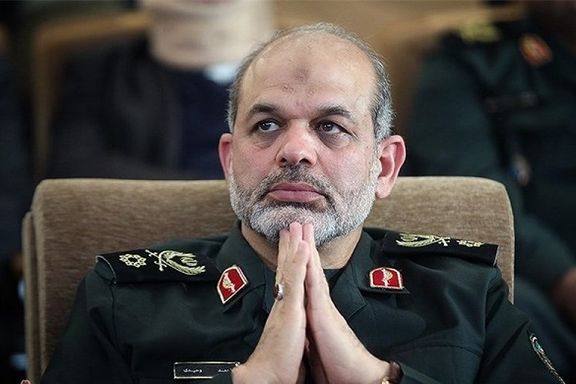
Iran’s interior minister has defended the appointment of Revolutionary Guard commanders as civilian governors, insisting that the policy has popular backing.
Ahmad Vahidi, himself an Islamic Revolution Guard Corps (IRGC) general, speaking in the religious city of Qom on Monday said when military leaders are willing to serve in civilian posts, and people welcome the move it can only benefit citizens.
There has been a lot of criticism in Iranian social media as President Ebrahim Raisi’s administration has appointed several IRGC generals to be provincial governors. The move is seen as an attempt to consolidate more power by the Guards who already have vast influence over the economy and politics of the country.
Vahidi also said that the world is waiting for Qom, the Shiite religious center of Iran, to rescue it from “the calamities brought about by the ignorance of Western civilization.” He added, “Western civilization led by America, Zionists and their allies are equipping terrorists all over the world and bombing people in Afghanistan, Yemen and elsewhere.”
The general’s comments come as in the past four years more Iranians have openly turned against the clerical government, coming into streets to protest and demanding a secular political system.
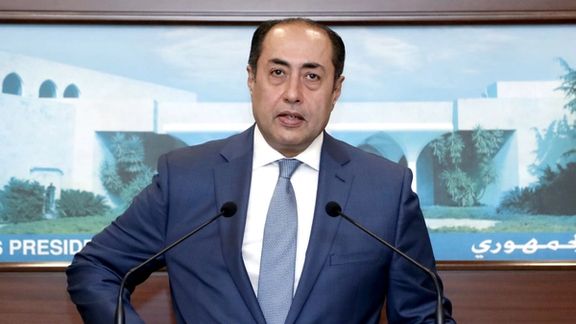
A top Arab League envoy was in Beirut on Monday to explore ways to resolve an unprecedented diplomatic rift between Lebanon and Saudi Arabia.
The crisis emerged following comments by Lebanon's information minister, who is close to Iran-backed Hezbollah, criticizing the war in Yemen that a Saudi-led coalition is waging against the Iran-backed Houthi rebels.
Arab League official Hossam Zaki said his visit was "an initiative to put the crisis on the right track."
Zaki, the league's deputy chief, told reporters after meeting Lebanese President Michel Aoun that he was ready to visit Saudi Arabia but that some tangible moves to ease the crisis have to be felt first.
Lebanon has said that Information Minister George Kordahi's remarks about Yemen, aired in late October, do not represent official government views.
Zaki later Monday also met Lebanese Prime Minister Najib Mikati and parliament speaker Nabih Berri.
The spat has threatened to destabilize Mikati's government, formed in September after a 13-month deadlock between rival Lebanese groups.
Mikati has urged Kordahi to "do what needs to be done" — an apparent appeal for him to step down but the minister has so far refused to apologize or resign.
Saudi Arabia has withdrawn its ambassador from Beirut and asked the Lebanese envoy to leave the kingdom.
Report by AP
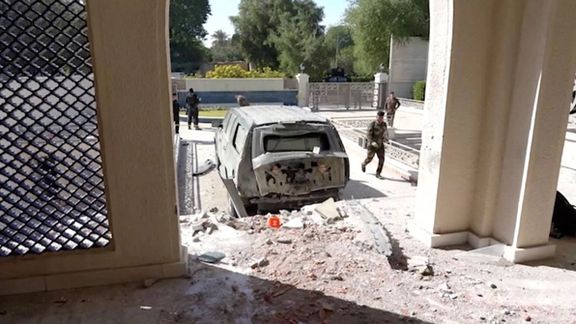
A drone attack that targeted the Iraqi prime minister on Sunday was carried out by at least one Iranian-backed militia group, Reuters reported on Monday.
The Iraqi security sources and sources close to the militias, who spoke to Reuters on Monday on condition of anonymity, said the drones and explosives used in the assault were Iranian-made.
A spokesperson for one Iran-aligned paramilitary group declined to comment immediately on the attack or on who carried it out. Other Iranian-backed groups could not be reached immediately for comment.
The Iranian government in Tehran did not immediately respond to requests for comment. On Sunday, Tehran condemned the attack and the official media tried to distance Iran from the incident, claiming that it was a plot against “resistance forces” in Iraq.
Prime Minister Mustafa al-Kadhimi escaped unhurt from the attack on his residence in the Iraqi capital Baghdad, which was carried out using explosives-laden drones.
Two Iraqi security officials and three sources close to the militia groups that Iran has supported in Iraq said the attack was committed by at least one of those groups but gave slightly different assessments of exactly which factions.
The two security officials said that the powerful Kataib Hezbollah and Asaib Ahl al-Haq groups carried it out in tandem.
One militia source said that Kataib Hezbollah was involved and that he could not confirm the role of Asaib.
Neither of those groups immediately commented for the record.
The incident could be seen as another sign of Iran’s interventionist regional policies that for years have alarmed some Arab states and the West.
No group has claimed responsibility for the attack, which raised tension in Iraq a few weeks after a general election disputed by Iran-backed militias including Kataib Hezbollah and Asaib.
The political parties that represent Iran-aligned paramilitary groups in parliament suffered crushing defeats at the polls on October 10, losing dozens of the seats they have controlled for several years.
On Friday their supporters targeted security forces guarding Baghdad’s green zone by throwing stones and injuring some servicemen. Security forces opened fire at the protesters and at least one was killed.
The Iran-backed armed militias do not like the prime minister who tries to maintain a balance between the Washington and Tehran and has good relations with the West.
The election defeat comes as the Islamic Republic boasts to its domestic audience about the influence of its Shiite ideology in neighboring Iraq. Iranian critics of the clerical regime say that after spending billions of dollars to gain influence in a Shiite-majority country, the people reject its local allies and its presence.
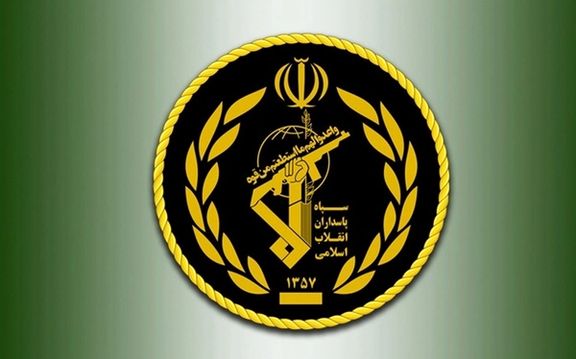
Iran and African countries have remained silent about Israeli media claims that Mossad had foiled Iranian plots to “target” Israeli nationals or Jews in Africa.
Israel's Channel 12 reported Sunday night that five people with African passports had been arrested by “local intelligence in these countries,” after Mossad, the external Israeli intelligence agency, had thwarted multiple Iranian “plots” against Israeli tourists and businessmen in Tanzania, Senegal, and Ghana.
The channel claimed the five had been trained in Lebanon and returned to Africa posing as religious students to identify Israeli targets, including tourists on safari in Tanzania, to attack.
In February, American and Israeli officials said Iran was behind a thwarted operation against the United Arab Emirates embassy in the Ethiopian capital, Addis Ababa, and that a cell of 15 had been arrested in Ethiopia and Sweden. Iran, which had condemned the ‘normalization’ of relations between the UAE and Israel, denied the accusations. In September Cyprus said it had arrested an Azerbaijani national over an Iranian plot to attack Israeli businessmen there.
Iran has always denied such allegations, either denying the Islamic Republic’s and IRGC's affiliation with the accused or claiming that these incidents were only plots to paint Iran in a bad light in the international community.
Iran has blamed Israel – and Israeli officials have appeared to confirm – acts of violence in Iran including explosion at Natanz enrichment facility in July 2020 and the killing of nuclear scientist, Mohsen Fakhrizadeh in November 2020.
Iranian officials recently also accused Israel and the United States of being behind a cyberattack that disrupted sales of subsidized gasoline to motorists. Gholamreza Jalali, head of Passive Defense Organization (PDO), which is in charge of cyber security, told Iranian state TV that Iran was sure that the US and Israel had planned attacks on Iran’s railways in July and the Shahid Rajaee port in May 2020. Five days after the fuel distribution attack, a group called ‘Black Shadow’ targeted an Israeli data and internet company.
Both Iran and Israel have stepped up their rhetoric since Fakhrizadeh's assassination. Last month a top Israeli official told Iran International that an attack against Iran's nuclear targets was a priority and Israeli media reported the military was beginning training. Channel 12 reported last month that Israel had allocated $1.5 billion for attacks on Iran.
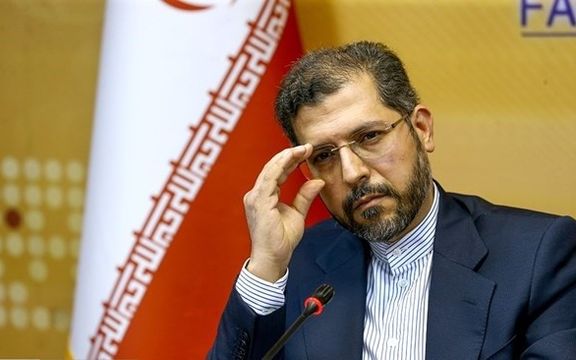
Iran’s foreign ministry said Monday that talks with Saudi Arabia have not stopped but a new round of meetings depends on Riyadh’s “serious will”.
Saeed Khatibzadeh, spokesman of the ministry in his weekly briefing told reporters that Saudi Arabia should refrain from media comments on the talks. Saudi Foreign Minister Faisal bin Farhan Al Saud told CNBC on October 30 that talks with Iran have not stopped but have made no “solid progress”.
Iran and Saudi Arabia began talks in April, reportedly with Iraqi mediation to reduce tensions and possibly restore diplomatic relations severed since January 2016.
Iran initially made optimistic assessments of the talks but later Saudi Arabia presented a more cautious picture, which appears to have annoyed Tehran.
The hardline government of President Ebrahim Raisi has pledged to improve relations with regional countries, as the United States and its European allies have raised the issue of Tehran’s aggressive behavior in the region and have said they expect Tehran to hold talks about its regional policies.
Saudi Arabia has indicated that Iran might be interested in holding talks to ward off Western pressure.